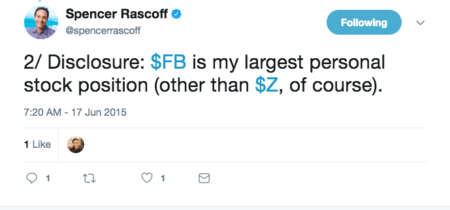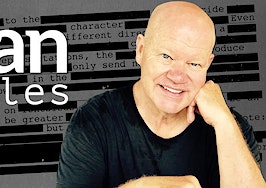I’m working on a new weekly email featuring my thoughts on the industry and more. Check out the last one here. Send me feedback at brad@inman.com. And if you would like this in your inbox, sign up here:
[email-signup]
A couple of years ago, Zillow CEO Spencer Rascoff crowed that his biggest stockholding next to his Z shares was his personal stake in Facebook.

In a gushing Tweet storm, he carried on about Facebook’s glory. If he still holds FB shares, he has made out like a Powerball winner — the stock has increased about 10x in the last five years, a better return than his sizable stake in Z.
Oddly, Rascoff’s investment may be a hedge. Facebook is proving to be a formidable competitor for the Seattle real estate search portal. While the two have a partnership allowing Zillow customers to buy ads on Facebook, describing the portal and the social network as friends is like saying President Trump and “rocket man” Kim Jong-un don’t want to annihilate one another.
Facebook, a virtual utility, is grabbing real estate ad dollars at a fast and furious pace. It has become an intricate multi-purpose real estate platform — from replacing old-school brokerage intranets with secret FB groups to publishing local real estate listings next to intimate conversations among friends.
Facebook has become an upstream alternative to Zillow.
Think about it. People go to Zillow to look for houses, whereas Facebook users are engaged all day and all night. Real estate agents on FB can draw in consumers and build relationships before they take that intentional step of looking for a house. That is the holy grail for agents.
Fifty-three percent of agents and brokers buy social media ads, according to a new report by research firm Borrell Associates. They are more likely to buy ads on social media than on listing portals, appearing to mark a significant shift in real estate marketing, concludes the study.
If for a minute you think Zillow is taking over the world quite easily, think again. They too face the “innovator’s dilemma” as Facebook, Google, Opendoor and Nextdoor line up to knock off the big real estate dog that has roamed the property streets unleashed for more than 10 years.
Nextdoor is like Facebook. The digital neighborhood app, which tracks crime and community goings on, is also upstream from Zillow. People hang out there without the intention of looking for houses. Agents are beginning to use the app to build relationships with neighbors who become customers later on.
And like Facebook, it is now taking direct aim at real estate ad dollars.
Covering more than 100,000 U.S. neighborhoods, the private social media network is rolling out a listing search tool that allows agents to buy ads on the site in a handful of markets. It is testing its new real estate program in the San Francisco Bay Area, San Diego, Portland, Phoenix, greater Atlanta and the Dallas-Fort Worth area. The company has raised over $210 million and has been valued at $1.1 billion.
Then there is Opendoor.
Zillow was transparent about the Opendoor threat when it launched its competing Instant Offers product last May, which opened up its platform to Wall Street investors who want to do a quick purchase of a home.
The success of the Instant Offers “test” is fuzzy because Zillow has held back details of the initiative.
But Zillow Chief Business Officer Greg Schwartz has been clear about the company’s fears and intentions.
The company line is that the search portal was coming to the aid of homesellers who are anxious about the uncertain process of selling a house.
But Schwartz also privately concedes that the search portal was riled over Opendoor’s early success. Fearing the innovator’s dilemma, Zillow scrambled to put a competing product into the market.
Suddenly, the Seattle company is threatened on multiple fronts. Like Germany in World War II, it is fighting radical business models like Opendoor, OfferPad and Knock on one border. From the other front, it faces nasty competition from killer ad models like Nextdoor, Google and Facebook.
This dicey situation has forced the portal to choose how disruptive it is willing to become. To compete with Opendoor, Zillow’s play-it-safe ad model doesn’t cut it. Its Instant Offers product, offering both investors and agents a shot at homeseller listings, was its somewhat-awkward attempt to keep its core advertisers happy as it waded into a business model that could blow up everything sacred to the industry.
Can Zillow have it both ways? Probably not.








